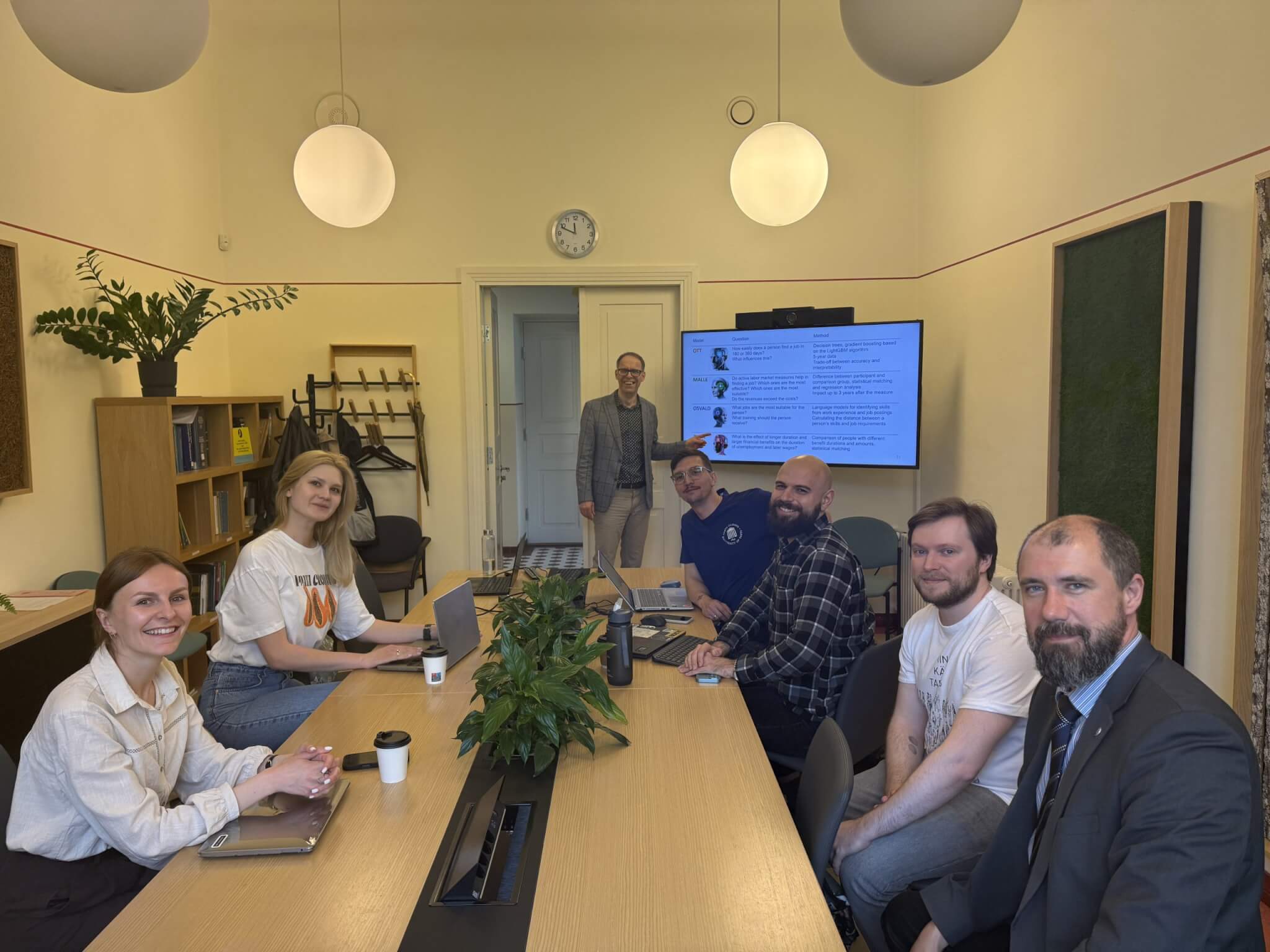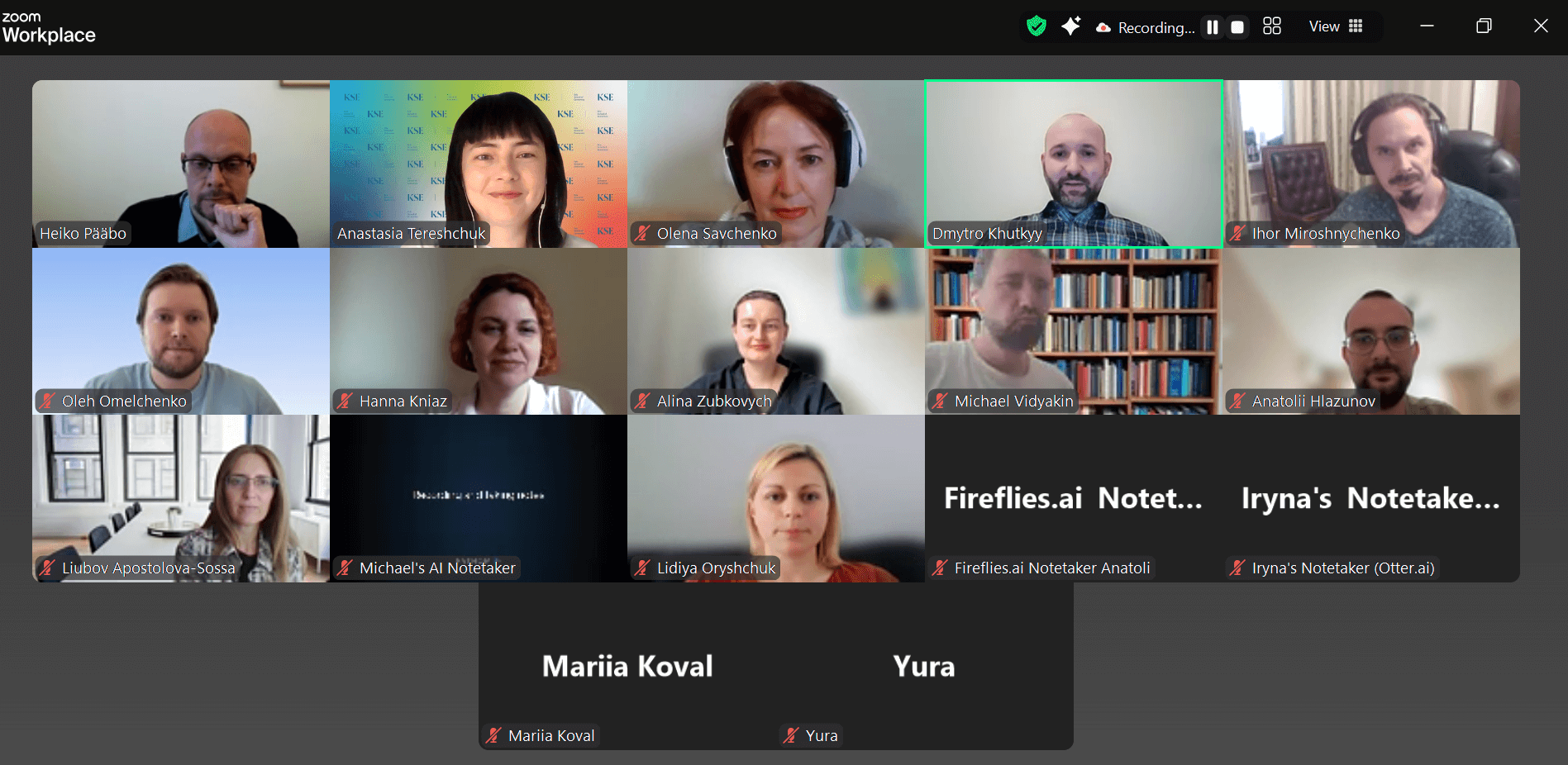- Kyiv School of Economics
- About the School
- News
- The BRIDGE project has completed a training series on AI and data analysis designed for faculty members and researchers at KSE
The BRIDGE project has completed a training series on AI and data analysis designed for faculty members and researchers at KSE
23 June 2025
March-June 2025 marked a period of intensive training activities within the BRIDGE project, laying a strong foundation for the broader training efforts planned throughout the project’s implementation. During this time, our partners from the University of Tartu delivered the program “Capacity-Building in Methods and Applications for Big Data and AI for Governance” for faculty and researchers at the Kyiv School of Economics. The program was co-developed with KSE and tailored to the current interests of our colleagues in this field.
The training consisted of three interrelated components that helped participants gain a deeper understanding of how artificial intelligence can be applied in public governance, education, and research.
The program began with a series of online webinars held from March to April. These sessions focused on key challenges faced by public institutions and policy analysts when implementing AI solutions. In three thematic meetings, participants engaged with:
Art Alishani, who explored the government’s role as a user, facilitator, and regulator of AI in public services;
Helen Eenmaa, who provided an in-depth explanation of the ethical requirements embedded in the AI Act, as well as the role of universities in shaping regulatory frameworks;
Indrek Kuusk, who guided participants through complex issues related to human rights, GDPR, and emerging case law in the AI domain.
Interactivity was a core element of the webinars: participants discussed real-life cases, compared legal interpretations, and analyzed practical scenarios of AI use in the EU.
The next stage of the program was an in-person training in Tartu, held on May 20-23 at the J. Skytte Institute of Political Studies. Over the course of four days, participants engaged in hands-on work with open data, explored tools for analyzing both quantitative and textual information, and discussed challenges related to data quality management and policy evaluation.The training began with Anastasija Nikiforova, whose session focused on the open data ecosystem, core principles of data visualization, and the potential of generative AI. Participants then worked with Martin Molder, who demonstrated how to build regression models, perform sentiment analysis and topic modelling in R, and visualize the results. On the final day, Andres Võrk shared Estonia’s experience in applying administrative data and machine learning to social policy evaluation. He presented examples of simulation models and demonstrated how data analysis can inform evidence-based policymaking.
Special focus within the program was given to the specialized trainings “AI for Research and Teaching,” held on June 17 and 19, 2025. These sessions were designed for faculty and researchers seeking to meaningfully integrate artificial intelligence into their teaching and scholarly work – from source analysis to course development.
On June 17, Heiko Pääbo, Head of the Center for Baltic Studies at the Institute of Public Administration and Political Science, University of Tartu, led a session titled “Integrating AI Tools into Written Assignments.” The training explored how to adapt the structure of written tasks in the context of students actively using generative AI, while maintaining pedagogical coherence, clear learning objectives, and academic integrity
On June 19, Yurii Kondratyk, Digital Skills Project Manager at the Faculty of Social Sciences, University of Tartu, conducted a training titled “Using Elicit for AI-Powered Literature Review.” Participants were introduced to the features of Elicit and LitMaps — platforms that support efficient, balanced, and transparent literature reviews, with an emphasis on streamlining research workflows and managing sources effectively.
These sessions not only introduced participants to new tools and methods, but also encouraged a broader view of working with data and algorithms as an integral part of dynamic educational and research practice. Participants are already preparing to share these insights with their colleagues at KSE and other academic institutions.
The entire program was designed not to offer ready-made solutions, but to provide participants with the tools and understanding needed to engage with AI responsibly, thoughtfully, and effectively in real-world contexts – across academia, policy analysis, and public administration.
We sincerely thank the University of Tartu, as well as our colleagues from Political Science – University of Tartu, the J. Skytte Institute of Political Studies, and the University of Tartu Ukraine Centre, with special thanks to Dmytro Khutkyi for his excellent coordination and collaborative partnership. We also extend our heartfelt thanks to all the participants for their trust, active engagement, and commitment to working deeply with the complex and critical topic of the responsible use of artificial intelligence in governance, education, and research.
Funded by the European Union. Views and opinions expressed are however those of the author only and do not necessarily reflect those of the European Union or European Research Executive Agency. Neither the European Union nor the granting authority can be held responsible for them.





